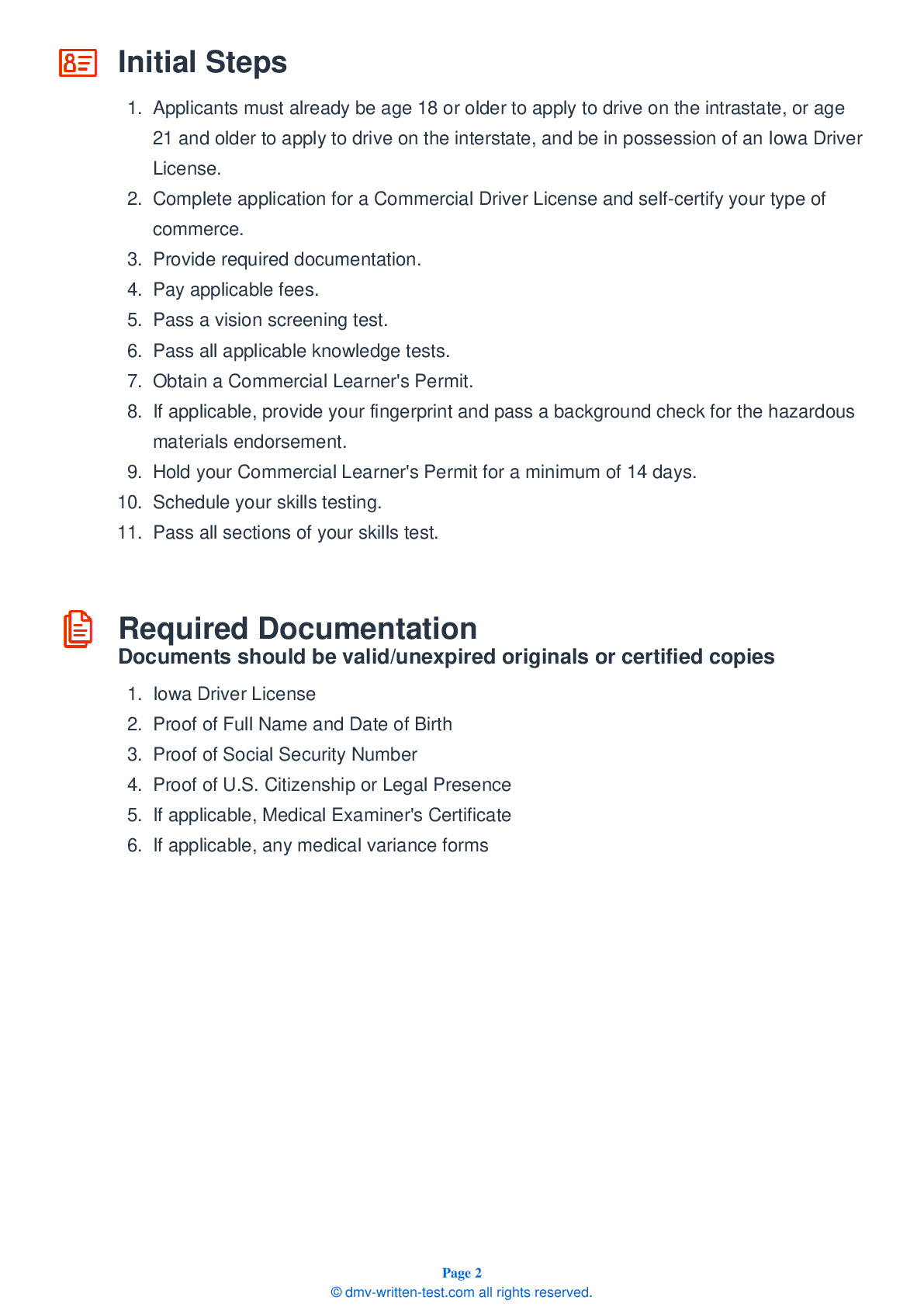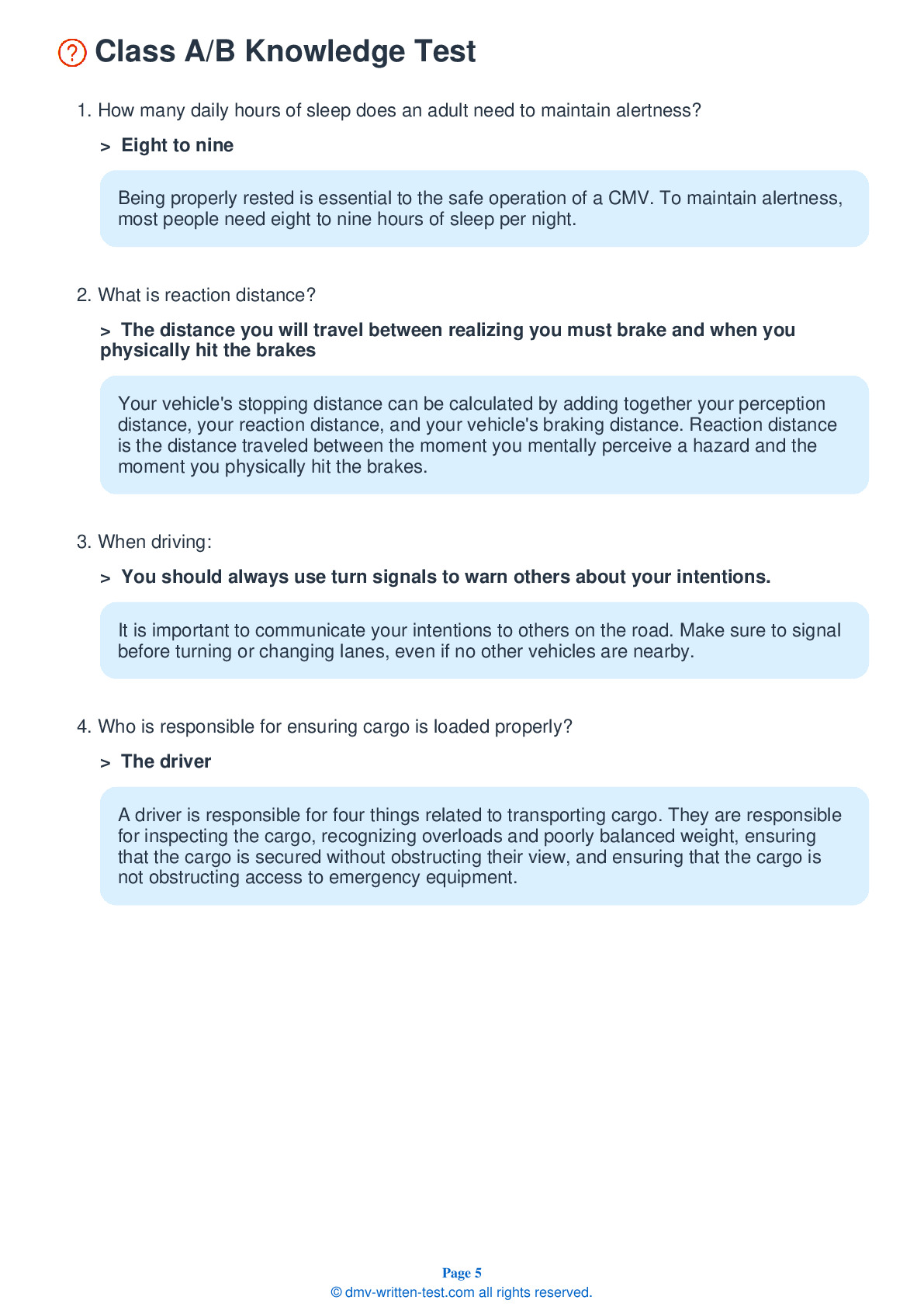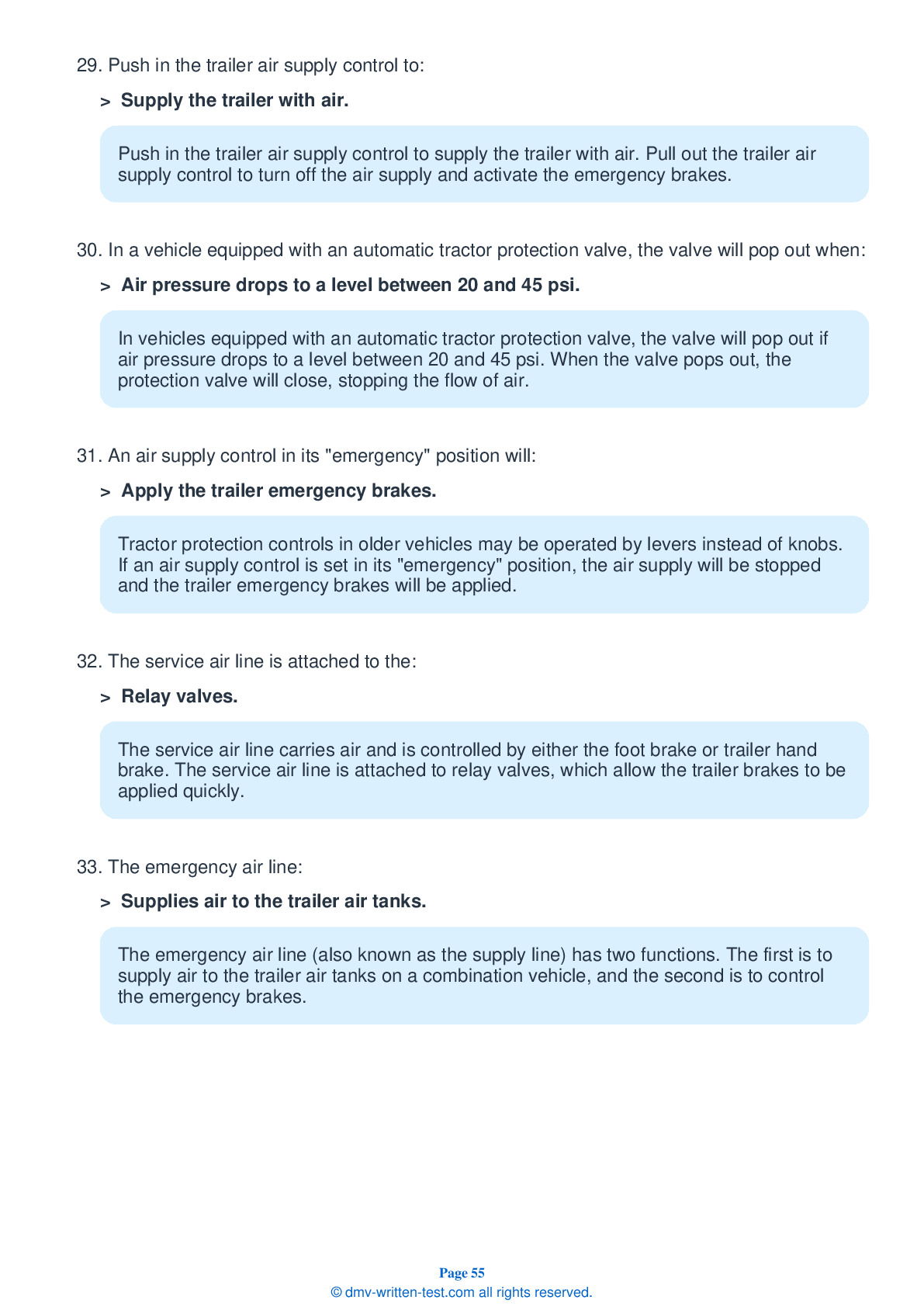Knowledge Test Class B
This license is required for driving a single vehicle with a GVWR of more than 26,001 pounds, and a trailer not to exceed 10,000 pounds gross vehicle weight rating, or a vehicle designed to transport 24 or more people (including the driver). To receive this license, applicants must pass a 50-question test. To pass, applicants must answer 40 questions correctly. Each question has three or four possible answer choices. Test questions come from the Iowa Commercial Driver License Manual. Questions come from chapters covering: Introduction, Driving Safely, Transporting Cargo Safely, Air Brakes (if applicable), Pre-Trip Vehicle Inspection Test, Basic Vehicle Control Skills Test and On-Road Driving.. Endorsements that may be used with a Class B CDL are: Hazardous materials, Tank, Passenger, HazMat and Tank, Air Brakes and School bus.
1. Do not base your decision to shift gears on:
One way to know when it is time to shift gears is to learn your vehicle's operating rpm range. You should shift up when your engine reaches the top of that range. You can also learn which speeds each gear is good for and shift up based on your speedometer.
2. When traction is poor, a driver should accelerate especially slowly:
You should accelerate very gradually when driving under slippery conditions. Using too much power in such conditions may cause you to lose control of your vehicle.
3. What is Gross Combination Weight?
Gross Combination Weight (GCW) is the total weight of a powered unit, its trailer(s), and the cargo being carried.
4. How can you check hydraulic brakes?
Check hydraulic brakes by pumping the brake pedal three times before applying firm pressure to the pedal for five seconds. The pedal should not move. If it does, there may be a leak or some other problem in the braking system.
5. When traveling long distances, you should:
To avoid becoming fatigued on a long trip, you should take a break after every 100 miles or two hours of driving. Driving through the night, or during any other time when you would normally be asleep, raises the danger of fatigue.
6. Which of the following is not part of a vehicle’s air brake system?
Components of an air brake system include an air compressor, an air compressor governor, air storage tanks, air tank drains, an alcohol evaporator, a safety valve, a brake pedal, foundation brakes, supply pressure gauges, an application pressure gauge, a low air pressure warning signal, a stop light switch, a front brake limiting valve (on some older vehicles), spring brakes, and parking brake controls.
7. During the driving test, the examiner will be scoring you on:
During the on-road driving test, the examiner will be scoring you on specific driving maneuvers, as well as your general driving behavior.
Frequently Asked Questions
To obtain a Class B CDL in Iowa, you must follow these steps:
1. Obtain a Commercial Driver's Manual from the Iowa Department of Transportation (DOT) or download it from their website.
2. Complete a DOT physical examination and obtain a medical certificate from a licensed healthcare provider.
3. Obtain a Commercial Learner's Permit (CLP) by passing a written knowledge test and a skills test in a vehicle of the same class that you wish to drive. You must also pass any additional endorsements required for your desired job, such as air brakes or passenger transport.
4. Practice driving with your CLP for at least 14 days before taking your skills test.
5. Schedule and pass your skills test, which includes a pre-trip inspection, basic vehicle control, and on-road driving.
6. Submit your application for a Class B CDL and pay the required fees to the Iowa DOT.
7. Once your application is approved, you will receive your Class B CDL in the mail within 7-10 days.
It's important to note that you must be at least 18 years old to obtain a Class B CDL in Iowa, but you must be at least 21 years old to drive across state lines or transport hazardous materials.
1. Straight trucks: This includes box trucks, dump trucks, and any other single-unit vehicles that do not have a separate trailer.
2. Buses: You can operate any bus designed to transport 16 or more passengers (including the driver), but you may need additional endorsements depending on the type of bus and its cargo.
3. Large passenger vans: You can also operate large passenger vans with a GVWR of 26,001 pounds or more designed to transport 16 or more passengers (including the driver).
It's important to note that if you want to drive a vehicle with air brakes, you will need to obtain an Air Brake endorsement in addition to your Class B CDL. Additionally, if you want to transport hazardous materials, you will need to obtain a Hazardous Materials endorsement and meet additional requirements set by the Federal Motor Carrier Safety Administration (FMCSA).
1. Age: You must be at least 18 years old to obtain a Class B CDL in Iowa, but you must be at least 21 years old to transport hazardous materials or drive across state lines.
2. Valid driver's license: You must hold a valid non-CDL driver's license in Iowa.
3. Medical certification: You must pass a medical examination and obtain a medical certificate from a licensed healthcare provider to demonstrate that you are physically qualified to operate a commercial motor vehicle.
4. Knowledge test: You must pass a written knowledge test covering the rules of the road and commercial driving regulations.
5. Skills test: You must pass a skills test that includes a pre-trip inspection, basic vehicle control, and on-road driving.
6. Background check: You will need to undergo a background check as part of the application process.
7. Proof of identity and residency: You will need to provide proof of your identity and residency in Iowa.
8. Fees: You will need to pay the required fees for your CDL application and any endorsements you may need.
It's important to note that if you have any disqualifying offenses on your driving record or criminal history, you may be ineligible for a CDL. Additionally, if you have any medical conditions that could affect your ability to operate a commercial vehicle safely, you may be disqualified or required to obtain additional medical certification.
If you are between the ages of 21 and 24, you can obtain a Class B CDL and transport hazardous materials within the state of Iowa, but you cannot drive across state lines.
For drivers who are 25 years old or older, there are no age restrictions for obtaining a Class B CDL and transporting hazardous materials across state lines. However, it's important to note that individual employers may have their own age requirements for hiring commercial drivers.
1. Passenger endorsement (P): Required for drivers of vehicles designed to transport 16 or more passengers, including the driver.
2. School bus endorsement (S): Required for drivers of school buses that are designed to transport 10 or more passengers, including the driver.
3. Tanker endorsement (N): Required for drivers of vehicles that transport liquids or gases in bulk containers with a capacity of 1,000 gallons or more.
4. Hazardous materials endorsement (H): Required for drivers who transport hazardous materials, as defined by federal regulations.
5. Combination endorsement (T): Required for drivers of combination vehicles with a total weight of 26,001 pounds or more.
It's important to note that each endorsement requires additional testing beyond the basic Class B CDL requirements, including written knowledge tests and skills tests. Additionally, some endorsements may require additional background checks and other requirements. You should check with your local Iowa Department of Transportation office to determine which endorsements you need for your specific situation.
1. Pre-trip inspection: Before you begin driving, you'll need to demonstrate your knowledge of the vehicle and its safety features by conducting a pre-trip inspection. You'll need to identify and explain the function of various parts, check the vehicle's safety equipment, and ensure that any cargo is properly secured.
2. Basic vehicle control: In this part of the test, you'll demonstrate your ability to control the Class B vehicle in a controlled environment. You'll be asked to perform maneuvers such as straight line backing, offset backing, parallel parking, and alley docking.
3. On-road driving: The final part of the test evaluates your ability to safely operate a Class B vehicle in traffic. You'll need to demonstrate your ability to navigate intersections, maintain proper lane positioning, signal appropriately, and obey traffic laws.
It's important to note that all parts of the skills test are conducted with a state-certified examiner who will evaluate your performance and determine whether you pass or fail. Additionally, you'll need to provide your own Class B vehicle for the test, which must meet certain state requirements for safety and operation.
1. No passengers: If you do not have a passenger endorsement (P), you may not transport more than one passenger who is not a fellow employee.
2. No hazardous materials: If you do not have a hazardous materials endorsement (H), you may not transport hazardous materials, as defined by federal regulations.
3. No combination vehicles: If you do not have a combination endorsement (T), you may not operate combination vehicles with a total weight of 26,001 pounds or more.
4. Air brakes: If you do not pass the air brakes knowledge and skills tests, you will be restricted to driving vehicles without air brakes.
5. Automatic transmission: If you take the skills test in a vehicle with an automatic transmission, you will be restricted to driving vehicles with automatic transmissions only.
It's important to note that these restrictions and limitations may vary depending on your specific situation and the state in which you hold your CDL. Additionally, violating these restrictions can result in fines, penalties, suspension or revocation of your CDL, or other consequences.
Iowa law allows for the use of an interpreter or translator to assist with the written test if you are not proficient in English. However, you will need to provide your own interpreter or translator, and they must be at least 18 years old and not have a vested interest in your passing the test.
Additionally, your interpreter or translator must sign an oath stating that they will accurately and impartially translate the test questions and your answers. The oath must be signed in the presence of a driver's license examiner or other authorized official.
It's important to note that even if you take the test with a translator, you will still need to demonstrate your ability to read and understand road signs and other important information in English.
To request accommodations, you should contact your local driver's license office and inform them of your disability and what accommodations you need. The Iowa Department of Transportation (DOT) will work with you to determine what accommodations are appropriate based on your specific needs and the requirements of the test.
Some examples of accommodations that may be available include extended time to complete the test, a separate testing room, a reader or scribe, or assistive technology such as a screen reader.
It's important to note that you will need to provide documentation of your disability and how it impacts your ability to take the test. This documentation should come from a qualified healthcare provider or other professional who can attest to your disability and what accommodations are needed.
Overall, the Iowa DOT is committed to ensuring that all individuals have equal access to driver's licensing services, including those with disabilities.
In Iowa, you must wait at least one day to retake the Class B CDL written test if you fail it. If you fail the test three times, you must wait at least 30 days before taking it again. After three failures, there is no limit on how many times you can retake the test, but a new fee is required each time.
It's important to note that passing the written test is just one step in obtaining a Class B CDL. You will also need to pass a skills test, which includes a pre-trip inspection and a road test, before you can obtain your license.
Overall, it's important to study and prepare thoroughly for the written test to increase your chances of passing on your first attempt. If you do fail, don't get discouraged – just use it as an opportunity to learn from your mistakes and try again when you are ready.




